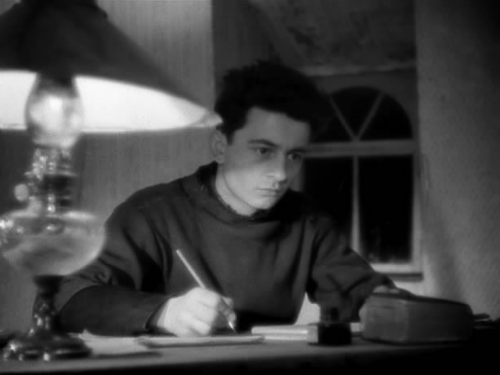
Countess: Love is stronger than death. Your scriptures say so.
Curé d’Ambricourt: We did not invent love. It has its order, its law.
Countess: God is its master.
Curé d’Ambricourt: He is not the master of love. He is love itself. If you would love, don’t place yourself beyond love’s reach.
“The cinema of Bresson is the infinite quest of that first astonishment, the daily and forgotten experience of immediate bursts of perception, which the body is first to receive. [...] Diary of a Country Priest is the first film in which Bresson makes the experience of this primacy of the body over consciousness, which will become the material of his entire work. [...] Before our contact with the world is named, it is experienced, like each cart that passes and repasses in front of the camera during the film. Those heavy horses and creaking axles are neither signs of agricultural activity, indications of the season, nor geographical emblems of a particular society: they are shrill creakings, spurts of mud, repetition.”
Vincent Amiel1
“After accustoming us to read over and over a text which the curé d'Ambricourt is in the process of writing – a novelty in the cinema - he forces us to look at a man, alone on the screen, and to read on his face all the interior movements of his soul, without deigning to show us his interlocutors, who soon are reduced to delivering monologues, whether it is the curé de Torcy, the defrocked priest, or his friend Oliver, to whom he does not even say goodbye. Often at the end of the shot an imperceptible travelling movement brings the face of the curé d'Ambricourt closer to us.”
Jean Sulivan
“In Bresson the monotone and the dead-pan represent not a mask, but a revelation of the essential man. His personages seem aloof because they are naked... The physical is spiritualized... ‘physicality’ and ‘materialism’ explain how the film feels so intense even though, dramatically, there is so little emphasis and so many omissions.”
Raymond Durgnat
- 1Vincent Amiel, Le corps au cinéma. Bresson, Keaton, Cassavetes (Paris: Presses universitaires de France, 1998) [This fragment was translated into English by Sabzian]